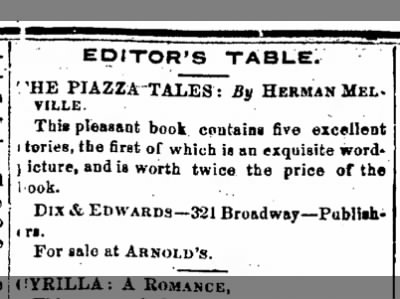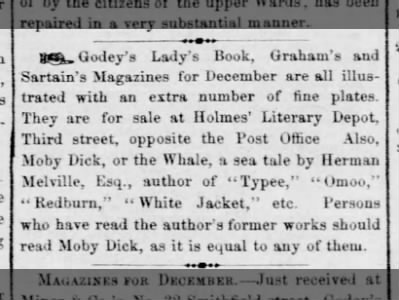As Gary Scharnhorst reported in
Melville Society Extracts 75 (November 1988), news of Melville's working trip to New York in June 1853 originally appeared in the Springfield
Republican on June 11, 1853. Melville's "new work" sounds like a book, probably the one his mother had said (in a letter to her brother Peter Gansevoort on April 20, 1853) was nearly ready for the press. Later the same year, in November 1853, Herman alluded to his having been "prevented from printing" it in New York. The only work in progress we know about for sure is the Agatha project, which
Hershel Parker logically relates to the working title "Isle of the Cross," mentioned twice in family letters from Herman Melville's cousin Priscilla to his sister Augusta.
I have a different view, admittedly conjectural and based on just nothing in the way of satisfying documentary evidence. Inspired by what strikes me as unusually strong internal evidence, I've long been holding out for a project of re-writing by Melville called "Fragments of Military Life," the working title of the book that Philip St. George Cooke eventually published as
Scenes and Adventures in the Army. Both parts of
Scenes and Adventures were previously published in the
Southern Literary Messenger, and the 1851-3 series
Scenes Beyond the Western Border which became Part II would be concluded in the August 1853 issue. Hypothetically, the job of "superintending" that project would have meant providing Harper & Brothers with printed copies of the magazine installments, much in the same way that, a few years later, Melville did publish the book version of
Israel Potter. Either the Harpers' lawyers or then Lt. Colonel Cooke himself might have "prevented" Melville from publishing a ghost-written or ghost-edited narrative of western travel that did not properly credit the well-known, highly regarded cavalry officer whose journals supplied most of the raw material.
Well, that
Christmas business chastened me all over again. It's always been hard
to voyage chartless, with no external evidence anywhere in the historical record linking Melville and the wandering dragoon, Philip St George Cooke. The revived claim for Henry Livingston's authorship of "A Visit from St. Nicholas" perfectly exemplifies how wrong one can go without reliable facts.
For the record, here is the original notice that Scharnhorst found in the Springfield
Republican, June 11, 1853. Images of this and the following items are available in the online archives of Historical Newspapers at
Genealogy Bank.
:
 |
| Springfield Republican / June 11, 1853 |
"Herman Melville has gone to New York to superintend the issue of a new work."
Four days later the Pittsfield news was reprinted verbatim in the Boston
Weekly Messenger (June 15, 1853):
 |
| Boston Weekly Messenger / June 15, 1853 |
The Franklin
Democrat [Greenfield, Massachusetts], June 20, 1853 reprinted the same Melville item under the head of "LOCAL INTELLIGENCE. / BERKSHIRE COUNTY.":
"Herman Melville has gone to New York to superintend the issue of a new work."
In early July the news from Pittsfield about Melville's trip to New York showed up in the Boston
Flag of our Union (July 2, 1853) under the heading, "Editorial Inkdrops":
 |
Boston Flag of our Union / July 2, 1853 |
Related post:
















